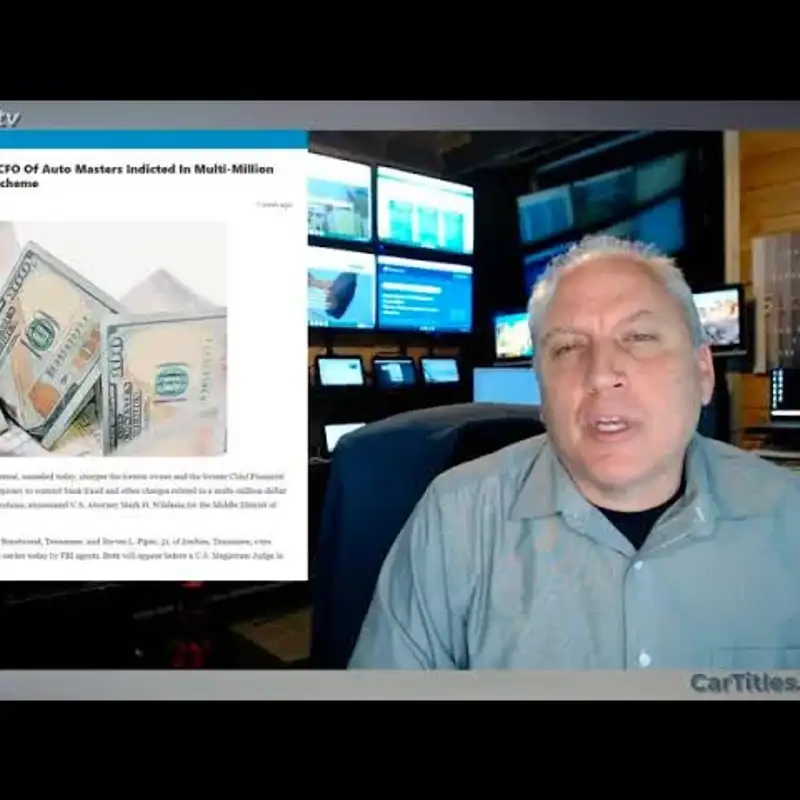Navigating Used Car Dealer Financing: Avoiding Title Problems?
Download MP3Today we're going to talk about two types of auto dealership fraud. In one example, we're going to look at how dealerships are defrauded themselves and how they lose millions of dollars from fraudulent transactions. We're also going to look at how dealerships defraud the marketplace.
First story is a very good example of how small used car dealerships can use an internal financing function that they have to collect millions of dollars they're not entitled to, and this article has to do with the dealership in Tennessee called Auto Masters. It's all legit right now—innocent until proven guilty, obviously—but basically what happens is when a small car dealership finances cars—Buy Here, Pay Here—when they have ads that say, “Look, we finance anybody,” here's how it works.
The customer goes to the dealership and let's say you buy a ten-thousand-dollar car. They put down two thousand dollars, and they finance eight. That dealership is the original lender of that loan, so the customer pays the dealership the car payments. It's not a bank, it's not a finance company, it's not, you know, Bank of America or Chase—it's actually paid to the dealership.
Because of that, the dealership is allowed to make their own credit decisions on financing, which sometimes allows for less qualified buyers to get credit. So the dealership will do the loan, they get their payments, and usually it's a weekly payment system where the customer comes in every week—usually when they get their paycheck—and they pay their weekly payments. On a monthly payment, it's a weekly payment, so instead of paying $400 a month, you pay $100 a week.
So the dealership lent this money out. But at some point, you know, they don't have millions of dollars to have out financing on the street. So they take, maybe once a month, the package of loans that they have—that $8,000 loan to this person, $10,000 loan to somebody else—they package them up and they have a line of credit from what's called a backup lender.
And they tell that backup lender, “Look, we have this package of loans. It's $152,000. Here's all the loans, here's the contracts, and I want you to lend us money based on these loans.” And they sign some authorization affidavits saying, “We really have these loans, the people are making payments, and we want to use that as collateral to get a loan from you so we can go buy more cars.”
Right, at some point, if you finance all your cars, you don't get cash for that ten-thousand-dollar car—you only have $2,000. So you can't go buy another ten-thousand-dollar car because the customer still owes you eight. So you get this line of credit, you get the money from the bank, and then you go buy more cars.
Well, there are some requirements. First of all, you have to actually have that loan out on the street. Second of all, it has to be performing, where you have to represent to the lender that the person’s actually making payments. Some of these lenders require that the dealer get two or three payments first—so it’s not a first-payment default—before they can get money refinanced from this backup lender.
Well, what this dealer did was they went to the backup lender and said, “Look, we have all these loans out on the street and we want to get financing for it.” And they actually collected almost $30 million from this backup lender without having proper loans in the street. They may have been made up from scratch. They may have been non-performing. They may have been delinquent. For whatever reason, they weren't real loans that were qualified to get them financing.
So how does this affect consumers? Well, what happens is for many of these loans, the titles are secured by the backup lender—or maybe they're not even acquired at all from the trading customer. So if you are a Buy Here, Pay Here dealership or a small dealership that does your own in-house financing and you don't pay off your lender, the customer might be in jeopardy of getting their title.
So there's a lot of dominoes that could fall for a lender or a dealer that doesn't do the paperwork the right way. So small used car dealers that do their own financing have these financial structures behind them that are usually invisible to the public but may create consequences both for the lender—because now they're out their money—and for the retail public—they may have title problems.
In our next video, we'll talk about how dealers can prevent fraud against them by people using basically fake IDs to buy vehicles.

